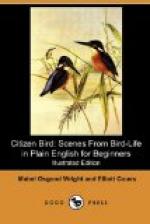“It is not easy to say why he was named so,” said the Doctor, “unless it is because he builds his nest higher up in trees than most of his Thrush kin. I am very glad you have had a chance to hear and see him at the same time; for he is one of the home birds you must make a place for in your very inside heart, with the Bluebird and Robin, though he does not return from his winter outing until after these two have begun nesting.”
[Illustration: Wood Thrush.]
“When he comes we are sure not only that it is Spring, but that Spring is in a pleasant, good-natured mood—that she is through with the tempers and crying fits she suffers from in March and April, and is kissing the buds of the early blossoms of May, coaxing them to open their eyes. When you see the first Wood Thrush hopping among last year’s leaves, you may look for jack-in-the-pulpit’s pointed nose and green and purple hood.
“As soon as this Thrush makes up his mind to settle in a certain place, he calls a mate to him with his thrilling song and begins house-building. From this time until he moults, late in July, every one in his vicinity may enjoy a free concert morning and evening, and at intervals during the day. Sometimes in cloudy weather he even sings at noon—a time when birds are most likely to be silent.
“In gratitude for what we owe him for his music and his work in the guilds, we must be patient with him when he secures the first ripe cherries from the top of the tree, before we House People know that they are even red. For every cherry and strawberry he bites, he pays ten times over by swallowing a hundred wicked hungry worms and bugs that eat everything and do no work in return. But House People are very blind about some things, and often act as if they had only one eye apiece, like the Cyclopes. We see one of these darling birds take a little fruit; we see more fruit with holes in it, and think that birds have done the damage, though a wasp or hornet may be the guilty party; and then we often say, ‘What a nuisance those birds are!’
“But all the rest of the growing year, when these same birds toil from sunrise until sunset, to clear away insect pests and give us a better crop of fruit next year, we do not notice it. You children, however, will have no such excuse for keeping one eye shut when you know Citizen Bird as he really is.”
“How late at night does the Wood Thrush sing?” asked Nat. “Does he never sleep?”
“Oh, yes, he goes to sleep when it is really dark, but at this nesting season the night in Birdland is very short; some of the feathered people are stirring at three o’clock, and by four all thrifty birds have dressed themselves to go out marketing for breakfast.”
“The Veeries are singing down by the river,” said Olive to her father; “perhaps we had better go there before it grows dark.”
“Veeries? Is that what you call those birds?” asked Rap. “I never knew their name, so I called them ‘sunset birds,’ to myself.”




